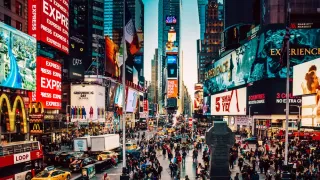May 3, 2023
Queer Artist Taylor Mac Looks at Where Belief and Reality Collide in 'Joy and Pandemic'
Kilian Melloy READ TIME: 8 MIN.
Prolific out playwright Taylor Mac has seen his work produced by major Boston-area theatre companies before – remember the five-hour epic "The Lily's Revenge," which the A.R.T. mounted in 2012? – and now he's back, this time with the world premiere of the topical play "Joy & Pandemic."
Don't be put off by the title. Among the very first stage directions in the script is the observation that the title contains the word "Joy," and indeed it refers to more than name of one of the main characters, a Christian Scientist running an art school in 1918 right in the midst of the great influenza pandemic, the Spanish Flu, a catastrophe that killed an estimated 50 million people worldwide. The play shifts time to 1951, when polio is ubiquitous in the U.S., and Mac's script allows very different views to debate, with faith and rationality not necessarily keeping what you might call a social distance. Other big themes come into play as well, including the women's rights, questions of race, the meaning of art, views about marriage, and the thoughtless maneuvers of power structures that – quite literally, in one scene – appropriate and re-represent the experiences of subjugated groups.
But the play is also a family comedy, with three generations grinding against one another in an age of stress and change. The dynamics aren't sentimental or sugar-coated, but rather complex and charged with denial and hostility as much as with love and devotion.
EDGE caught up with Taylor Mac to hear his thoughts on how the play reflects our times, and cosmic coincidences figured into the play's unlikely premiere courtesy of the Huntington Theater Company.
EDGE: I was thinking when I got a copy of the script that it would be a huge opus – I was thinking of "The Lily's Revenge," I guess, and expecting five hours of a play. But "Joy & Pandemic" is not any longer than the typical two-hour play.
Taylor Mac: It's two hours. It's a three-act play, but it's only two hours. There's a little pause between act one and act two, and then there's an intermission. The content dictates the form, and this particular form was begging for something more realistic.
EDGE: It's interesting how you're looking at the 1918 pandemic, and then polio in the 1950s, and the parallels to what we've all just been through with COVID.
Taylor Mac: Yeah, it wasn't really a pandemic [in the 1950s]. There were just a lot of polio cases – [although] nothing, not even a smidgen, compared to the AIDS epidemic, or our current pandemic, or the Spanish Flu.
EDGE: Why did you choose those two time periods in particular?
Taylor Mac: I'd already started the play when the pandemic happened, and I'd already set it in [1918] and the Spanish Flu was kind of part of it, but not really. And it just seemed like, I shouldn't delete that; maybe I should dig into it, especially since we were all taken by surprise by the pandemic, even though it just seemed like, shouldn't we have all been talking about this for the last 100 years? So, I thought, "Well, I don't want to delete it just because it's topical now, and I might as well dig in."
Also, I'm fascinated in how belief and reality continually butt heads – I mean, throughout the world, but particularly, it's a very American thing. I wanted to say, "Oh, we're in the Spanish flu, and then years later we're dealing with polio." How that all relates to this moment is part of what the play is doing, but it's much more than about a pandemic, that's for sure.
EDGE: Something else the play discusses, perhaps a little obliquely, is race and racism, which is another perennially hot topic.
Taylor Mac: "Hot topic." I love how racism is a hot topic! It shouldn't be a hot topic. It should be, "Let's try to figure out how to stop it." But yes, it does feel that way, the way that it's described in the world. I got into being an artist, and particularly being a playwright, because I'm trying to understand how the world works, so I want to talk about it all. So much of our understanding of race – and by race, what I really mean is ethnicity, because there's only one race, the human race – so much of what we talk about has to do with the difference between belief and reality. A lot of people have a belief that it's one way, and a lot of people's reality is another way, and that dictates a lot of our legislation. I want to dig into that. It's part of a theme that is very present in our lives right now.
EDGE: What was it that brought you to premiere this play with the Huntington Theater?
Taylor Mac: Well, it was commissioned for San Francisco at The Magic Theatre, and I wrote it for them to do a production, but then the pandemic happened, and it was postponed and rescheduled. Then, right as we were about to go into rehearsals, the Delta variant came out and there were breakthrough infections. The play is really funny, but I didn't want to invite audience members into the theater and have them sitting there being told by various characters that we shouldn't be gathered right now. That just doesn't seem very funny to me. So, I said, "Let's not do it right now. Let's figure out what's happening with these breakthrough cases and how dangerous it is." So, we postponed it again, and then at that point it became very economically challenging to do it in San Francisco.
Loretta [Greco], though, had left The Magic, where she was directing the play, and she became the artistic director at Huntington. She asked me if she could do it there. I was thrilled because the play has a lot to do with Christian Science – or that's kind of like a subplot of the play – and my mother as a Christian Scientist, and the mother church is in Boston, so I just thought. "Oh my gosh, even though the play is set in Philadelphia is just so perfect!" I'm actually in my hotel room looking across the street at the mother church right now.
EDGE: Speaking of drag and hot topics, are you considering maybe writing something that will address the current huge legislative pushback on artistic expression for drag artists, for LGBT people, transgender children, all of this craziness?
Taylor Mac: Oh, God, no. My work, in itself, is the pushback; I don't have to write something specifically about it. "Joy and Pandemic" is maybe the most realistic thing I've ever written.
I've got a new piece that's coming out that's 55 songs; it's called "Bark of Millions." It's four hours long, and it's just song after song after song. Every song was inspired by a different queer person throughout world history, and it's performed by an ensemble of 24 people. It's just this great big meditation on queerness. So, for me, that is addressing it without having to be like, "And then the legislator did this." Like, that's just not my kink, that kind of writing.
But "Bark of Millions" is the queerest thing I've ever written; it's so beautiful to hang out with a bunch of queer people and sing songs about our antecedents. They're not really about them, but they're inspired by all of these people – people that you would know and people that you wouldn't know, and it's not trying to teach the audience who these people are, it's just trying to inch our way towards some kind of understanding of what it is to be queer without straight people informing us what it is to be queer. How do we live from this perspective, when we don't often have parents who are raising us with an understanding of queerness? Sometimes people do, but often they don't. So, we kind of lose track of any kind of connection to those who came before us. It's just kind of beautiful to hang out in that, and I think that will [address the obstacles we face] way more.
[And] I've got a movie coming out. I can't tell you exactly what it is, but I have a movie coming out in June that will do way more than if I directly addressed [these topics].
EDGE: Have you done a movie before?
Taylor Mac: I'm short films and I've been an actor in some really bad sci fi movies, but I've never I've never been a part of the feature before. This is a bit of a concert doc, but it's pretty great.
"Joy & Pandemic" continues through May 21 at the Calderwood at the Boston Center for the Arts. For tickets and more information, follow this link.






